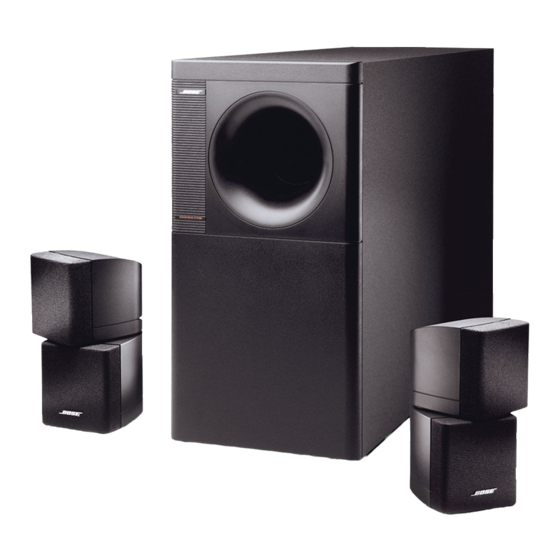Bose WAVE RADIO III Owner's Manual - Page 3
Browse online or download pdf Owner's Manual for Stereo System Bose WAVE RADIO III. Bose WAVE RADIO III 28 pages. Owner's guide
Also for Bose WAVE RADIO III: Owner's Manual (28 pages), Owner's Manual (24 pages), Owner's Manual (26 pages), Owner's Manual (28 pages), Service Manual (10 pages)

1. Read these instructions – for all components
before using this product.
2. Keep these instructions – for future reference.
3. Heed all warnings – on the product and in the
owner's guide.
4. Follow all instructions.
5. Do not use this apparatus near water or
moisture – Do not use this product near a bathtub,
washbowl, kitchen sink, laundry tub, in a wet
basement, near a swimming pool, or anywhere else
that water or moisture are present.
6. Clean only with a dry cloth – and as directed by
Bose Corporation. Unplug this product from the wall
outlet before cleaning.
7. Do not block any ventilation openings. Install
in accordance with the manufacturer's
instructions – To ensure reliable operation of the
product and to protect it from overheating, put the
product in a position and location that will not
interfere with its proper ventilation. For example, do
not place the product on a bed, sofa, or similar
surface that may block the ventilation openings. Do
not put it in a built-in system, such as a bookcase or
a cabinet that may keep air from flowing through its
ventilation openings.
8. Do not install near any heat sources, such as
radiators, heat registers, stoves or other
apparatus (including amplifiers) that produce
heat.
9. Do not defeat the safety purpose of the
polarized or grounding-type plug. A polarized
plug has two blades with one wider than the
other. A grounding-type plug has two blades
and a third grounding prong. The wider blade
or third prong are provided for your safety. If
the provided plug does not fit in your outlet,
consult an electrician for replacement of the
obsolete outlet.
10. Protect the power cord from being walked on
or pinched, particularly at plugs, convenience
receptacles, and the point where they exit
from the apparatus.
11. Only use attachments/accessories specified
by the manufacturer.
12. Use only with the cart, stand,
tripod, bracket or table specified by
the manufacturer or sold with the
apparatus. When a cart is used, use
caution when moving the cart/
apparatus combination to avoid injury from
tip-over.
I
S
MPORTANT
13. Unplug this apparatus during lightning storms
or when unused for long periods of time – to
prevent damage to this product.
14. Refer all servicing to qualified service
personnel. Servicing is required when the
apparatus has been damaged in any way: such
as power-supply cord or plug is damaged;
liquid has been spilled or objects have fallen
into the apparatus; the apparatus has been
exposed to rain or moisture, does not operate
normally, or has been dropped – Do not attempt
to service this product yourself. Opening or
removing covers may expose you to dangerous
voltages or other hazards. Please call Bose to be
referred to an authorized service center near you.
15. To prevent risk of fire or electric shock, avoid
overloading wall outlets, extension cords, or
integral convenience receptacles.
16. Do not let objects or liquids enter the product
– as they may touch dangerous voltage points or
short-out parts that could result in a fire or electric
shock.
17. See product enclosure bottom for safety
related markings.
18. Use Proper Power Sources – Plug the product
into a proper power source, as described in the
operating instructions or as marked on the product.
19. Avoid Power Lines – Use extreme care when
installing an outside antenna system to keep from
touching power lines or circuits, as contact with
them may be fatal. Do not install external antennas
near overhead power lines or other electric light or
power circuits, nor where an antenna can fall into
such circuits or power lines.
20. Ground All Outdoor Antennas – If an external
antenna or cable system is connected to this
product, be sure the antenna or cable system is
grounded. This will provide some protection against
voltage surges and built-up static charges.
Section 810 of the National Electrical Code ANSI/
NFPA No. 70 provides information with respect to
proper grounding of the mast and supporting
structure, grounding of the lead-in wire to an
antenna discharge unit, size of grounding
conductors, location of antenna-discharge unit,
connection to grounding electrodes, and
requirements for the ground electrode. Refer to the
antenna grounding illustration on the next page.
I
AFETY
NSTRUCTIONS
English – 3
